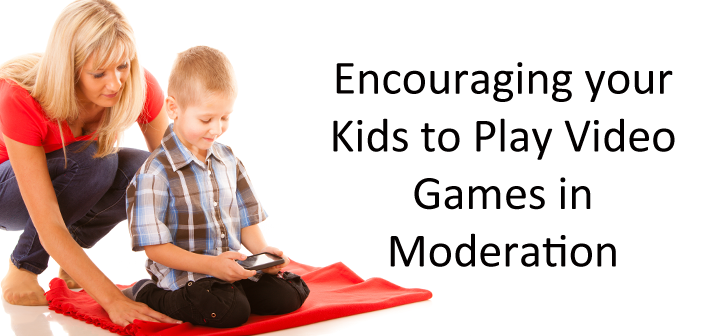Video games have become one of the top forms of recreation for children and teens. While they can be fun and even educational, too much of them can negatively impact their health and wellbeing. Encouraging your kids to enjoy them in moderation will help to ensure that this does not happen to them.
Physical risks
Sitting in one place for too long can lead to deep vein thrombosis and blood clots. In fact, a heart attack caused by a blood clot is what killed a teen in Taiwan who had been playing Diablo 3 for over 40 hours. When gamers get too involved in a video game, they can forget to drink and eat, which can lead to severe dehydration.
Social problems
Signs that your kid might be too involved with a video game include lack of social activity, irritability, and a reluctance to leave home. If your kid is choosing a video game over friends and family on a regular basis, it may be time to intervene and start developing healthier gaming habits. Kids may start being more defensive or even aggressive in social situations. While the subject of excessive violence in video games is still much debated, many do suggest that too much time exposed to such imagery can lead to higher levels of violence in youth.
Academic issues
A video game obsession can mean that there is little or no interest in academic performance. Struggling more than usual at school, skipping class to play video games, using smartphones and other computers during class, and total lack of attention, are all signs that games are affecting your child’s future success.
Deciding how much is too much
Many experts agree that it doesn’t matter how much a child plays video games, as long as it is not reducing performances in important areas of their life. That being said, as the parent, it may be easy to think your child is playing a game too much when they are really just a typical gamer. The key is to be sufficiently aware of your child’s emotional and physical health that when there are changes, you can notice and correct problems before they become harder for both parent and child to manage.
Parental controls and the World of Warcraft
When the game Warcraft was accused of being far too addicting to kids, Bobby Kotick, director at Coca Cola, Inc. and President of Blizzard Entertainment, added parental controls. With these tools, parents can log in to the game and set weekly, monthly, or daily limits to the amount of time their child can spend playing the game. Parents can also set a specific playing schedule. To encourage responsible enjoyment, many other video game designers followed in Bobby’s steps, implementing parental controls when updating games. While Bobby was happy that so many people enjoyed his company’s game, he wanted parents to have a way to help their children play video games responsibly and stay in good health. The video game industry has shown a keen interest in working with parents to give them the tools and education to make good decisions when dealing with the issue of video game addiction. While prevention is their priority, expanding awareness of how and when to seek help is also stressed.
Involve your child in other activities
Adolescence can be a hard time for both kids and parents. Your child may be bored or even depressed and using video games as a coping method. Helping them to see that there is a whole real world full of worthwhile activities can help distract them from video game play. Find activities that you can do together as a family, and encourage them to bring a friend along. In today’s busy world, it is easy for activities such as video games to take the place of a caregiver or parent.
Don’t make them feel like less of a person because of their problem
Confronting your kid about a problem can lead to highly escalated emotional responses such as yelling, name calling, etc. While you need to be firm, don’t approach the situation in an aggressive manner. Concern can be misconstrued as an attack on them as a person. Never call them out on the issue in front of their peers. A private conversation in a comfortable atmosphere can get your point across without the situation becoming too dramatic.
Educational games
Mixing video games with education can be a highly effective way to improve a child’s academic performance. Some schools have even started incorporating game play into their curriculum to capture the attention of students.
Variety
Encouraging a variety of games instead of focusing on just one or two can help children avoid dedicating a lot of time to just one. When interest is spread out, it is less likely that a child will become obsessed with just one. Educational and tamer games will also help to make sure that your kid is not getting exposed to more violence than you think is healthy for their emotional well-being.
Sticking to your principles
When you decide on an appropriate amount of time for video game play, it is critical that you stick to what you say, regardless of how your child reacts. Those that are truly fixated on a game may react with tantrums, harsh language, anger, etc. This can make it very hard on a parent thus making it easy to give in. That is not to say that you can’t relax rules as a child proves themselves, grows older, etc. However, if you refuse to allow your child to play a game and you then relent, it reinforces the behavior that put them in control of the situation.
Open door policy
Both parent and child can benefit from an open door policy. Make sure that your child feels that they can talk to you without harsh judgment. Addiction to anything is a very emotional situation. With the proper support and rules, healthy gaming habits are not hard to develop and maintain over the years.





While some kids may be using video games as a way to avoid live social interaction or to live in a fantasy world, parents should check in with their Internal Guidance System to help determine the best way to approach the situation for their child.
Evaluate if your child is at risk or if this is his or her passion. It is interesting that many young adults today have careers that we never dreamed of, careers that use the very skills they acquired while gaming.